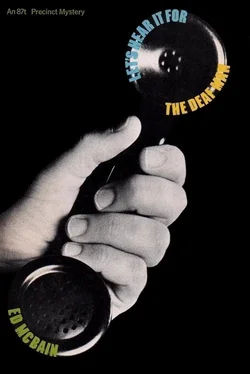“The library,” Carella said.
That’s who it was, all right.
The man with the fancy hair styling was none other than:

In a city where streets, avenues, boulevards, bridges, airports, high schools, and even race tracks were named after past presidents, it was perhaps no great honor to have a mere circle so-named — but then again, who remembered Van Buren except perhaps in Kinderhook, New York, where he’d been born? Anyway, there it was, Van Buren Circle. And at 14 Van Buren Circle, there was a branch of the First Federal Bank. At last it all made sense — or at least Carella thought it made sense. Which is exactly why he was suddenly so troubled. If everything made sense, then nothing made sense. Why would the Deaf Man pinpoint the exact location of a bank he planned to rob on a date he had already announced? Symbiosis aside, something else was surely coming, and Carella could not guess what.
An apartment is alive only when the people who live in it are there. When they are away, it becomes nothing more than a random collection of possessions, essentially lifeless. To a policeman sitting in the dark in the empty hours of the night, the place resembles a graveyard for furniture.
In the living room of 648 Richardson Drive that night, Bert Kling sat in an easy chair facing the front door, the walkie-talkie in his lap, his revolver in his right hand. It was difficult to stay awake. Occasionally, to relieve the monotony, he would contact Mike Ingersoll, who was in a similarly vacant apartment at 653 Richardson, across the street. Their conversations were almost as dreary as their separate vigils.
“Hello, Mike?”
“Yes, Bert.”
“How’s it going there?”
“Quiet.”
“Same here.”
“Talk to you later.”
At ten minutes to midnight, the telephone rang. Sitting in the darkness, Kling nearly leaped out of the chair on the first ring, and then realized it was only the phone. He listened as it rang six times and then went silent. In as long as it took for the caller to re-dial, the phone began ringing again. This time there were fourteen rings before it went still. The caller might have been someone who did not know the tenants of the apartment were away; he had called once, assumed he’d misdialed, and tried again. On the other hand, the caller might have been the burglar, checking and then double-checking to make certain the tenants were still away. In which case, he now had his information and would come tiptoeing up to unlock the front door, let himself in, and burglarize to his heart’s content.
Kling waited.
At twelve-thirty, Ingersoll contacted him on the walkie-talkie.
“Hello, Bert? Anything?”
“Telephone rang a while back, that’s all.”
“Nothing here, either.”
“It’s going to be a long night, Mike.”
“No longer than last night,” Ingersoll said.
“Talk to you.”
“Right.”
They talked to each other every forty minutes or so. Not one single burglar tried to enter either of the apartments all night long. At the first sign of light in the east, Kling contacted Ingersoll and suggested that they knock off. Ingersoll sighed and said, “Yeah, I guess so. You want some coffee before we head home?”
“Good idea,” Kling said. “Meet you downstairs.”
A patrol car was parked on the street in front of 657 Richardson, the building in which Augusta lived. Kling and Ingersoll walked to it rapidly. The patrolman behind the wheel recognized them and asked if they’d been sent over on the squeal.
“What squeal?” Kling asked.
“Guy ripped off an apartment in there.”
“You’re kidding,” Kling said.
“Would I kid about a felony?” the patrolman asked, offended.
Kling and Ingersoll went into the building and knocked on the superintendent’s door. It was answered by a woman in a bathrobe, who said her husband had gone upstairs to 6D, with the cop. Kling and Ingersoll took the elevator up, got out on the sixth floor, glanced down the hallway, and walked immediately to the left, where the partner of the patrolman in the car was examining a door and jamb for jimmy marks, the super standing just beside him.
“Anything?” Kling asked.
“No, it’s clean, Bert,” the patrolman said. “Guy must’ve got in with a key.”
“Let’s take a look, Mike,” Kling said. To the patrolman, he said, “Have you called this in, Lew?”
“Henry took care of it downstairs. We knew what it was already ’cause the super’d been in here. In fact, I thought you was the detective they sent over.”
“No,” Kling said, and shook his head, and walked through the foyer into the apartment, Ingersoll directly behind him. The layout was identical to Augusta’s apartment on the eleventh floor, and so he knew exactly where the bedroom was. The place was in total disorder, clothing strewn all over the room, drawers pulled from dressers and overturned.
“Something’s missing,” Ingersoll said.
“Huh?”
“No kitten.”
They walked to the dresser. Kling, remembering Mr. Angieri’s experience, looked behind the dresser, thinking the kitten might have fallen there.
“Wait, here it is,” Ingersoll said.
The kitten was a small glass figurine, white, with a blue bow around its neck. It sat next to a sterling-silver comb-and-brush set, which the burglar had apparently decided not to steal.
“Guess he’s running out of live ones,” Ingersoll said.
“Might get some prints from this, though,” Kling said.
“I doubt it.”
“Yeah, he’s too smart for that.”
“How do you like this son of a bitch?” Ingersoll said. “We’re sitting in two apartments so close we could spit at him, and he’s got the guts to rip off this joint. Jesus!”
“Let’s talk to the super,” Kling said.
The super’s name was Phillip Trammel. He was a thin man in his sixties wearing bib overalls and a blue denim work shirt.
“How’d you discover the burglary?” Kling asked him.
“I was coming up to get the garbage. We ain’t got no incinerator in this building. What the tenants do is they usually leave their garbage outside the service entrance in plastic bags, and I take it down to the basement for them. It’s a little service we perform, you know? Ain’t nothing says the super’s supposed to go around picking up garbage, but I don’t mind, it’s a little extra service.”
“So what happened?”
“I saw the door to 6D was open, and I knew we’d had that burglary in Miss Blair’s apartment little more’n a week ago, so I went inside and looked around. Somebody’d been in there, all right. So I called the police, and here you are.”
“Here we are,” Ingersoll said, and sighed.
When you are dealing with a man who sends you a picture of a football team, you have to believe he is crazy — unless you think you understand the way his mind works. The boys of the 87th would never in a million years have presumed to understand the workings of the Deaf Man’s mind. But since they now possessed a considerable body of knowledge upon which to base some speculations, they turned to the latest photostat with something resembling scientific perspective.
If Washington meant First...
And Hoover meant Federal...
And Vilma Banky meant Bank...
What did a football team mean?
Van Buren, of course, meant only Van Buren, which was not much help.
But Zero meant Circle.
So what did a football team mean?
“Why not a baseball team?” Meyer asked.
“Or a hockey team,” Carella said.
Читать дальше













